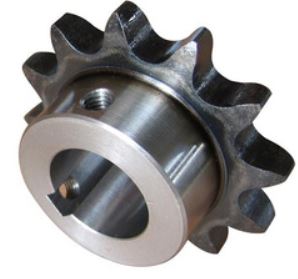Finished bore sprockets are precision-engineered components used in power transmission systems, designed with a pre-machined bore that is ready for immediate installation onto a shaft without additional modifications. These sprockets are crucial for maintaining accurate alignment, reducing vibration, and ensuring efficient torque transfer in various industrial applications, including conveyor systems, agricultural machinery, and automotive drives.
Our finished bore sprockets are manufactured to meet high standards of durability and performance. Below is a detailed breakdown of their parameters using lists and tables for clarity.
| Parameter | Description | Common Values |
|---|---|---|
| Bore Diameter | The inner diameter of the sprocket hole, precision-machined to fit standard shaft sizes. | 0.5 inches to 4 inches (12.7 mm to 101.6 mm) |
| Number of Teeth | Total teeth count affecting speed ratio and torque transmission. | From 10 teeth to 60 teeth, customizable based on application. |
| Pitch | Distance between the centers of adjacent teeth, critical for chain compatibility. | Common pitches: 0.25 inch, 0.375 inch, 0.5 inch, 0.75 inch, etc. |
| Hub Configuration | Design of the hub area, which can be plain or with additional features like keyways or set screws. | Options include: plain bore, keyway bore, or threaded bore for secure mounting. |
| Overall Diameter | External diameter of the sprocket, influencing space requirements in machinery. | Varies from 2 inches to 12 inches (50.8 mm to 304.8 mm) based on teeth count and pitch. |
| Weight | Mass of the sprocket, important for balancing and inertia calculations. | Ranges from 0.5 lbs to 15 lbs (0.23 kg to 6.8 kg) depending on size and material. |
Finished bore sprockets are versatile and used across multiple industries. Common applications include:
What is a finished bore sprocket?
A finished bore sprocket is a type of sprocket that comes with a pre-drilled and machined bore, ready to be mounted directly onto a shaft without any further modification. This makes installation quicker and more precise compared to unfinished bore sprockets.
How do I select the right finished bore sprocket for my application?
To choose the correct sprocket, consider factors such as the shaft diameter (bore size), number of teeth for the desired speed ratio, chain pitch compatibility, material based on environmental conditions (e.g., corrosion resistance), and load requirements. Refer to manufacturer specifications or consult with an engineer for tailored advice.
Can finished bore sprockets be customized?
Yes, many manufacturers offer customization options for bore size, keyway dimensions, number of teeth, and material coatings. This allows for perfect adaptation to specific machinery needs, though it may involve longer lead times and higher costs.
What maintenance is required for finished bore sprockets?
Regular maintenance includes lubricating the chain and sprocket interface to reduce wear, checking for signs of corrosion or tooth damage, and ensuring proper alignment to prevent premature failure. Inspections should be done periodically based on usage intensity.
Are finished bore sprockets interchangeable with other types?
They are interchangeable with similar sprockets that have the same bore size, pitch, and tooth count. However, always verify compatibility with your system's specifications to avoid mismatches that could lead to inefficiency or damage.
What is the typical lifespan of a finished bore sprocket?
The lifespan varies based on usage, load, and environment but generally ranges from 5,000 to 20,000 hours of operation. Proper maintenance and correct installation can significantly extend this duration.
How does bore tolerance affect performance?
Tight bore tolerances ensure a snug fit on the shaft, minimizing play and vibration, which enhances efficiency and reduces noise. Loose tolerances can lead to slippage, increased wear, and potential system failure.
Can I use finished bore sprockets in high-temperature environments?
Yes, if made from materials like heat-treated steel or stainless steel with appropriate coatings. Always check the manufacturer's temperature ratings to ensure suitability for your specific conditions.
What are the common failure modes for finished bore sprockets?
Common failures include tooth wear due to abrasion, bore wear from improper fit, corrosion in humid environments, and cracking under excessive load. Regular inspections help identify early signs and prevent catastrophic failures.
Where can I purchase high-quality finished bore sprockets?
They are available through industrial suppliers, online marketplaces, and directly from manufacturers. Ensure you choose reputable sources that provide certifications and warranties for reliability.


